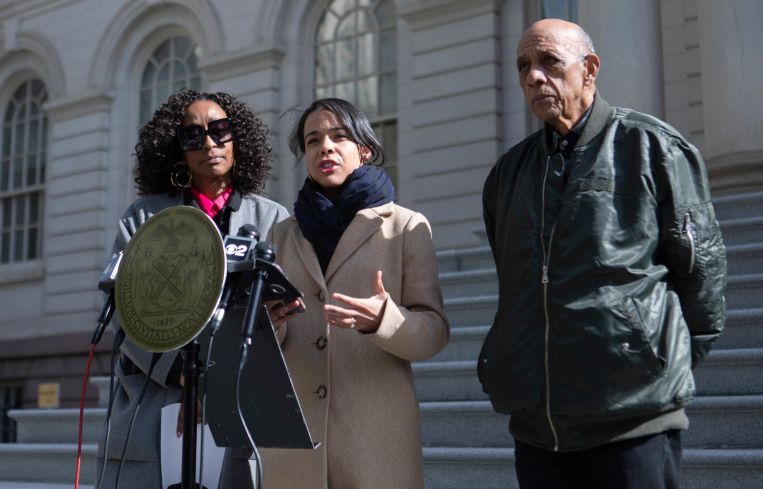NYC Considers New Law to Prevent Building Collapses
By Abigail Nehring April 26, 2024 4:05 pm
reprints
The New York City Council might put a new building safety law on the books in response to the partial collapse of 1915 Billingsley Terrace in the Bronx last December.
Council Member Pierina Sanchez announced the “The Billingsley Structural Integrity Act” on Thursday to create a new program to assign risk scores to buildings to gauge the likelihood of a structural failure. And it would require owners to respond swiftly to correct issues that emerge, or face escalating civil penalties.
The aim is to address what Sanchez described as a “systemic issue” with how the Buildings Department detects and responds to hazards. She represents the Morris Heights neighborhood, where dozens of tenants were displaced this winter after a structural column at the corner of the seven-story apartment building gave way.
“Questions remain about what the Department of Buildings could have done to prevent this tragedy and whether our systems are doing enough to let us know whether we are doing enough to keep our tenants safe,” Sanchez said when she announced the bill on the steps of City Hall ahead of a buildings oversight hearing.
The risk score in the proposed legislation would use existing building data to weigh eight factors — including a building’s age, size and construction material — and its history of permits, violations, facade inspections and 311 complaints. It will then give owners 10 days to draw up a corrective action plan, or face mounting fines and penalties.
The Billingsley Terrace incident was the second major collapse in New York City in a single year, after a parking garage at 57 Ann Street in the Financial District pancaked to the ground last April, killing one garage employee and injuring several others.
The council’s Buildings Committee has held a series of hearings in the wake of the incidents, and is also considering a package of legislation aimed specifically at parking garages introduced last year.
Yet, in both cases, the Buildings Department is still carrying out its investigations and has not gotten to the heart of each matter. However, the DOB reached a settlement in February with the structural engineer who it says misidentified a structural support column at the Billingsley Terrace building as merely decorative, but the settlement did not include an admission of guilt, and a spokesperson for the agency said its investigation is continuing.
In Thursday’s oversight hearing, the DOB changed its tune on the cause of the parking garage collapse, saying yesterday it was not due to the weight of too many cars, as it originally thought.
It came to that conclusion after hiring LERA Consulting Structural Engineers to conduct an independent investigation into the parking garage collapse, DOB said Thursday, but it does not plan to get an outside firm involved in the Billingsley Terrace investigation.
Michael De Chiara, a partner at law firm Zetlin & De Chiara, said the city’s investigation process after such serious events should prioritize understanding the cause of the collapse.
“There’s a huge array of potential factors, and it could also be a combination of factors that come together that cause this thing to happen,” de Chiara said in an interview with Commercial Observer shortly after the Billingsley Terrace collapse.
“Once we figure out what the mechanism of the collapse was, then the question is how repeatable is this?” de Chiara said.
DOB Commissioner James Oddo told the City Council the agency was “supportive” of the legislation Sanchez announced Thursday, but concerned about its capacity to take on a new inspection program without additional funding.
“We are concerned that being mandated to perform proactive inspections without additional resources will strain our existing inspectorial resources,” Oddo said.
The Buildings Department has taken longer to respond to emergency and non-emergency complaints this year compared to last year, according to the most recent update to the Mayor’s Management Report, with the agency taking 12.5 days on average to respond to complaints, a 2.5-day increase from last year.
Abigail Nehring can be reached at anehring@commercialobserver.com.



